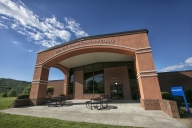You have /5 articles left.
Sign up for a free account or log in.
 Everyone in higher ed seems to know Josh Eyler. Some things have changed in Josh’s life since we last caught up. I thought it was time to check in with Josh, so he can give us an update:
Everyone in higher ed seems to know Josh Eyler. Some things have changed in Josh’s life since we last caught up. I thought it was time to check in with Josh, so he can give us an update:
Q1: Let’s talk first about your incredibly well-received new book How Humans Learn: The Science and Stories behind Effective College Teaching. First, how did you find the time and energy to write a book while balancing everything else in your alt-ac life? Second, how has publication How Humans Learn impacted your career? Finally, what is your next book?
I learned so much writing the book, and I loved the research process and the opportunity to interview other faculty and watch them teach in their classrooms. However, it was tricky at times, as you note, to make space for writing. Early mornings were important at the beginning. I often did a lot of research in the time before my family woke up to start the day. Once the writing began, though, summers were very important. The slower pace of a university during the summer opened up some time where I could write for longer periods. I do have to say, too, that Brian Gibson--the person to whom I reported at Rice--was amazingly supportive of the project, and he made it clear that I could schedule time here and there on my calendar to write during the week as well.
As a writer, the best possible outcome of putting a book out there is to have readers enjoy it and find it valuable, so it’s been a real honor to hear from folks who are engaging with it. Since the book has come out, I have had the extraordinary opportunity to visit with faculty and students at campuses across the country and to hear about the amazing work they are doing with respect to teaching and learning. Effecting change in higher education will take collaboration across disciplinary and institutional boundaries, and I see all of us who are working to improve teaching and learning as being on the same team. The more we learn about and celebrate and build on each other’s work, the closer we can get to making meaningful change across the board. I’m grateful for what I’ve learned from folks at these other campuses, and--I have to say--it’s hard not to be optimistic when you see how devoted people are to their students and their campuses. What they really need is fewer obstacles standing in the way of their great ideas.
My next book is intended for parents, educators, students, and policy-makers. It’s a holistic look at the impact of grades on learning, academic motivation, stress, mental and physical health, family relationships, and more for students from kindergarten through college. I’ll then present some solutions to these multifaceted problems. I’ve been poring over the research for months now, and I’ve just about finished polishing up a book proposal, which I plan to start sending out soon.
Q2: You have a new gig. Director of Faculty Development at the University of Mississippi. Can you give us the elevator pitch of what you will be doing at Ole Miss?
I do! And I’m really excited about the work we’re doing. I’ve joined a terrific team of colleagues in the Academic Innovations Group, led by Bob Cummings, who are focused on teaching and learning initiatives. So, in some ways, I’m doing work that is similar to what I’ve done in other positions.
For the next 5 years, though, I’ll be focusing primarily on our ThinkForward Quality Enhancement Plan, which is geared toward helping students to improve their critical thinking skills. We have targeted lower-division courses for this program, and there is a lot of wonderful, positive energy being directed toward these efforts. To be honest, from the moment I first set foot on campus it was clear that the community was one that cared deeply about education and about student success. I’m very happy to be here.
Q3: Okay, let’s talk about what everyone really wants to know. You chose to leave a tenured faculty role for the crazy career journey that we call alt-ac. What were you thinking? But seriously, the lack of job protection and academic freedom that we experience off the tenure track is a challenge for those who combine leadership and scholarship roles. (As you do). Care to reflect? Any advice to offer?
This is kind of a tough question, because in many ways it was a deeply personal decision, and it is one that others might not be able to make for a variety of reasons. It was important to me that I build my career based on the kinds of issues and challenges I thought I could help with rather than thinking about the particular position I held.
I believe we have reached a kind of tipping point where effective, powerful, evidence-based teaching matters more than it ever has before, and I really wanted to be a part of working with colleges and universities to adopt these strategies for the benefit of our students. In the end, tenure was less important to me than the opportunity to work on programs that I find meaningful with colleagues who want to improve education.
I’ve always been able to continue teaching and doing research in these positions, so--for me--it was the right combination of everything I find valuable about an academic career. I’m also very fortunate that my wife, Kariann Fuqua (a Visiting Assistant Professor of Art and Art History at the University of Mississippi), believes the same thing, so we’ve mapped out our careers according to these values.
What do you want to ask Josh?








